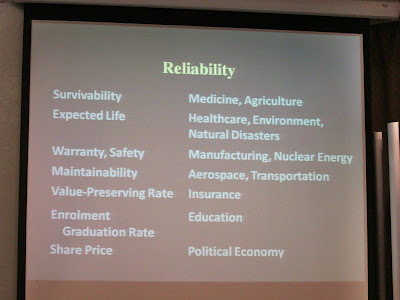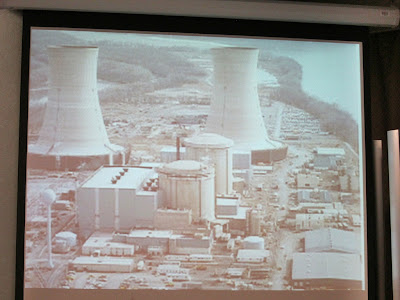A seminar entitled "Reliability of Nuclear Power" was organized by Environmental Division of The Hong Kong Institute of Engineer (HKIE) on 11 April 2011. Nuclear energy is the most clean energy resource and is statistically the safest industry compared to power plants using fossil, water, natural gas and all the other energy sources, but diligent maintenance and execution of safety measures are keys to ensuring nuclear safety and security.

Prof. Way KUO (President of City University of Hong Kong) was invited to share his view.
Prof. KUO explained different focus of reliability in different industry. Warranty and Safety were two main reliability factors on Nuclear Energy.
Then he demonstrated many accidents case in the world even though space industry in USA. Any minor thing neglect would cause error and accident.
Three Mile Island accident was briefed. (Class 5)
Chernobyl disaster was mentioned. (Class 7)
Prof. KUO used an old man to explain the aging effect and the nuclear power station life time was about 40 year (critical point). He joked that the marriage critical year was 7yr, if they could pass it, they were safe.
Japan Earthquake was not able to destroy the Fukushima Daiichi Nuclear Power Station but the Tsunami destroyed the water cooling system. (Class 4 upto Class 6, Class 7 on 12 April 2011)
After that he showed the safety statistic of accident in different industries in USA for reference.
Prof. KUO concluded that human error was the key factor indicating that human was not reliable.
Another statistic demonstrated that the nuclear power had more advantage compared with others.
Finally, Prof. KUO discussed the future Nuclear Power Plans as follows:
l Nuclear energy for more than electricity; High-temp gas reactors have redundant safety systems that rely on natural physical processes more than human or mechanical intervention.
l The Fuel Cycle to Make Nuclear Energy Safe, Security, Economic and Sustainable. "Open-ended" vs "Close" fuel cycle
l Energy Policy Research to enhance "Close" fuel cycle study.
The seminar ended with a Q&A session where interactive discussions were made. Human factors and independent third-party supervision should be strengthened to minimize the risk.
Prof. Way KUO received souvenir from the representative of EN Division.
Reference:
EN Division of HKIE Online - http://www.hkengineer.org.hk/program/home/pink.php?dept=envir
















沒有留言:
發佈留言